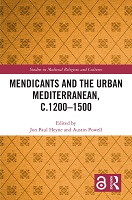Mendicants and the Urban Mediterranean, c.1200–1500

Contributor(s)
Heyne, Jon Paul (editor)
Powell, Austin (editor)
Language
EnglishAbstract
This volume explores the relationship of mendicant men and women to cities and their inhabitants in the Mediterranean world, c.1200–1500. It asks questions including: what was specifically “urban” about the mendicant movement? what does it mean to think of the mendicants as an “urban phenomenon”? and was there anything common to mendicant experiences in the cities of the Mediterranean?
In addressing these questions, the volume expands our understanding of the mendicants by offering chapters that examine this religious movement within urban environments from the Iberian Peninsula, North Africa, Southern France, and Italy, to the Dalmatian Coast, Aegean Islands, Egypt, and the Levant. The chapters treat a wide array of textual, artistic, and architectural sources to consider how mendicants navigated and negotiated the unique social dynamics of Mediterranean cities in their interactions with political potentates, merchants, prisoners, pilgrims, religious and intellectual elites, non‑Christians, and inhabitants of the surrounding countryside. It thus offers an interdisciplinary and broad survey of mendicancy as a social‑religious phenomenon of the urban Mediterranean, demonstrating that these communities can be defined by much more than their traditionally accepted roles as beggars, preachers, and teachers.
Mendicants and the Urban Mediterranean, c.1200–1500 will be of interest to scholars and students across multiple disciplines engaged in questions about medieval mendicancy, gender, urban society, inter‑religious encounters, and the Mediterranean.
Keywords
Mendicants,Mediterranean,Urbanism,History,Late Medieval HistoryDOI
10.4324/9781003377245ISBN
9781003377245, 9781032454962, 9781032454979Publisher
Taylor & FrancisPublisher website
https://taylorandfrancis.com/Publication date and place
2025Imprint
RoutledgeSeries
Studies in Medieval Religions and Cultures,Classification
History
European history
Christianity
